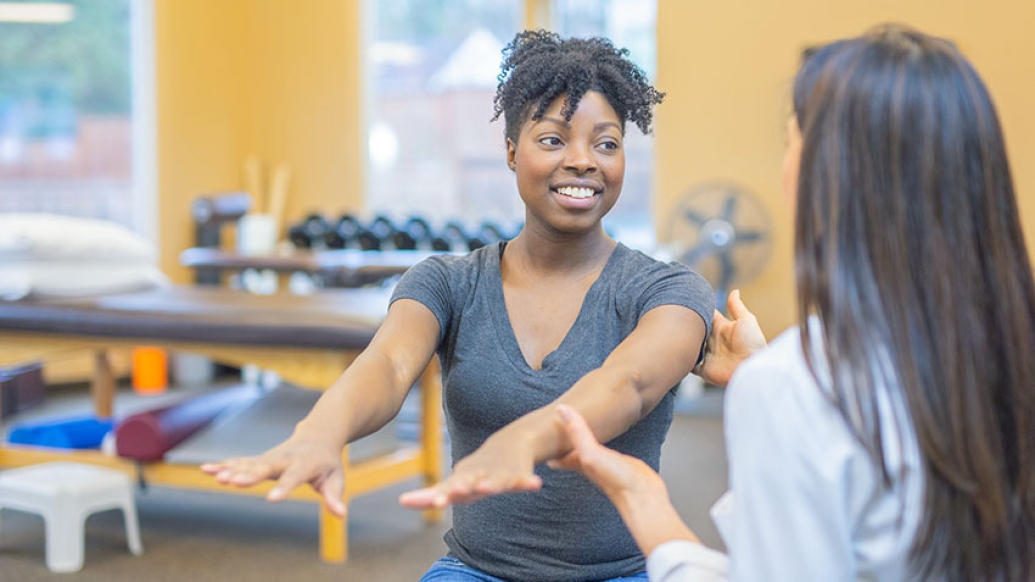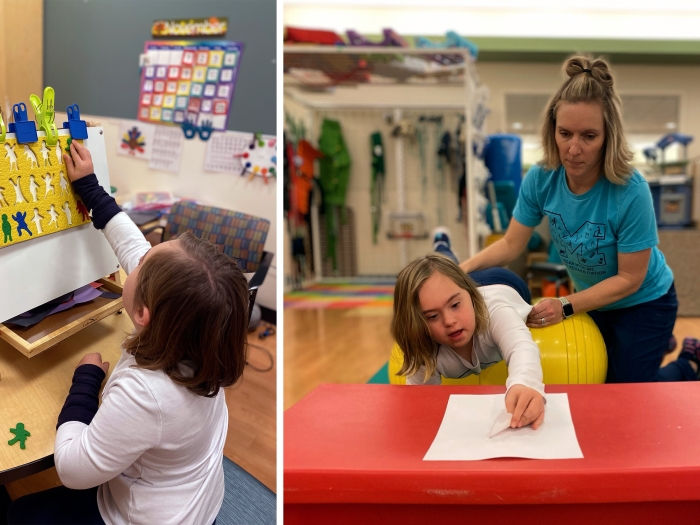Rehabilitation care can repair and restore the body after many cancer treatments leave patients weak, fatigued and in pain.
9:49 AM
Author |

Many patients think of cancer care as chemotherapy or surgery to remove a tumor or mass. But, there is one important treatment that is often overlooked: rehabilitation.
Breast cancer, in particular, can leave many patients with painful symptoms and side effects that rehabilitation could help ease.
"We've noticed that many patients with breast cancer have greatly benefited from the rehabilitation care we can provide," says Sean Smith, M.D., an associate professor of physical medicine and rehabilitation at Michigan Medicine and medical director of the Cancer Rehabilitation Program at the University of Michigan Rogel Cancer Center.
The Cancer Rehabilitation Program offers patients, with any type of cancer, at any point in treatment, comprehensive rehabilitation services and care.
"One of our most robust programs for patients with breast cancer is the lymphedema program, which involves hands-on therapy by specialty-trained occupational therapists," Smith says. "But, we also see a lot of patients greatly improve from symptoms such as pain in the shoulder and chest, and stiffness from aromatase inhibitors, or medications that stop the production of estrogen in postmenopausal women."
Smith says many patients with breast cancer often don't realize rehabilitation care is available for them, and that it's performed by experts specifically trained to help the patient group.
"The expertise for rehabilitating cancer patients at Michigan Medicine is matched by few institutions," he says. "Patients coming here can be sure that they will receive a thorough, detailed and individualized approach to their care by people who understand the complicated and difficult medical treatment they have received."
Here, Smith highlights five reasons why rehabilitation care is important for patients with breast cancer.
1. Rehabilitation care helps to treat the physical and mental side effects of cancer.
Smith says the most common reason for rehabilitation care in patients with breast cancer is chest or shoulder issues after surgery and radiation. This can include pain, tightness, numbness and more.
"We also diagnose and treat problems related to chemotherapy, including neuropathy or cognitive issues, aromatase inhibitors, such as stiffness, pain and trigger finger, and the disease itself, such as back pain and cognitive issues with metastatic disease," he says.
The team helps with both the physical aspects of rehabilitation, such as a patient needing supportive braces or having a tough time reaching overhead due to tightness from radiation therapy, as well as the cognitive side effects of cancer treatment.
"We help patients that have neuropathy from chemotherapy and we provide options for treatment including balance therapy," Smith says. "We also help treat 'chemobrain,' or what patients often describe as a mental cloudiness or cognitive impairment from chemotherapy."
2. Cancer rehabilitation care is specialized to the patient's specific needs.
The Cancer Rehabilitation Program practices what they call "impairment-driven cancer rehabilitation."
"That's a complicated way of saying we treat whatever problem a patient describes," Smith says. "For example, if a patient wants to be able to throw a ball with her grandchild, we work on that. Our program is always 100% patient-centered and individualized to their needs."
Smith says the cancer rehabilitation team includes physicians, physical and occupational therapists, psychologists and additional experts, to address whichever needs a patient is experiencing.
"The physicians are cancer rehabilitation physicians, which means that they sub-specialize in treating neurologic, musculoskeletal and cognitive problems that patients experience due to cancer treatment," he says. "Our therapists often receive additional certifications to be able to best treat cancer-related issues, including lymphedema, radiation fibrosis and more."
3. Rehabilitation care benefits patients at any point along their cancer treatment timeline.
Whether a patient is currently going through breast cancer treatment, or is in remission, the cancer rehabilitation team is ready to help.
"We treat patients all along the cancer treatment timeline — from those newly diagnosed, to those who have been free of disease for decades, to those with metastatic disease," Smith says. "Before we meet a patient, we conduct a thorough review of their cancer treatment history so that we are prepared to make a plan after talking with the patient."
4. Patients don't need a referral to see a rehabilitation specialist.
Making an appointment with a cancer rehabilitation specialist at Michigan Medicine can be done a couple of ways.
"Often times, patients are referred by one of their oncology providers to see either a physician, therapist or psychologist," Smith says. "Of course we also have patients call for an appointment without a referral, which is great, too."
He notes that once a patient sees one member of the team, they are sometimes referred to another provider if it would help in their overall treatment.
"A physician might refer a patient for lymphedema therapy, or a therapist may suggest a referral to a psychologist if the patient is struggling with cognitive issues," Smith says.
5. Adding rehabilitation care to cancer treatment can benefit a patient's quality of life.
"Patients who are treated for cancer often are assumed to be back to normal when their treatment ends, but Michigan Medicine and the U-M Rogel Cancer Center recognize that is not the case," Smith says. "It's not uncommon for patients to be dealing with the after effects of cancer treatment long after treatment ends."
The rehabilitation team of experts can help restore a patient's quality of life, no matter what type of cancer they are experiencing. Smith says the goal is always to get the patient back to doing what they enjoy, whether that be spending time with their family, returning to work or keeping up with their hobbies.
He adds, "Patients with breast cancer, or any form of cancer, don't have to endure these issues, but they often don't know how to get help or the amount of help that is available to them. They can take the first step by contacting our team, or asking their doctor for a referral. We would love to meet with them and develop a plan to help them recover from cancer-related symptoms."
Learn more about the Cancer Rehabilitation Program and schedule an appointment.

Explore a variety of healthcare news & stories by visiting the Health Lab home page for more articles.

Department of Communication at Michigan Medicine
Want top health & research news weekly? Sign up for Health Lab’s newsletters today!





